England could become the ‘family court of the world’, a lawyer has warned following a Court of Appeal ruling involving a multi-billion pound Russian divorce settlement.
Potanina v Potanin (No.2) was remitted to the Court of Appeal following the Supreme Court’s ruling in January 2024 that the current practice in financial remedies was ‘contrary to the applicable rules of court and to a fundamental principle of procedural justice’.
Natalia Potanina and Vladimir Potanin married in Russia in 1983 and divorced, also in Russia, in 2014. During the marriage they ‘became “massively rich”’. the judgment notes. The Russian courts’ approach was to divide all marital property equally. Shortly after the divorce, the wife obtained a UK investor visa and bought a property in London.
In 2018, Potanina lodged an application for financial relief under Part III of the Matrimonial and Family Proceedings Act 1984, but this was dismissed by the High Court.
Allowing her appeal and setting aside the judge’s dismissal of the wife’s application for leave, Lord Justice Cobb, with whom Lady Justice Falk and Lord Justice Moylan agreed, said: ‘The wife had, in my judgment, amply established that there was substantial ground for her claim for some financial relief, even if not a “full blown” award.’
The judges found Potanina had a ‘real and meaningful connection’ with England, was ‘habitually resident’ and had been for at least a year, and was ‘well placed to present a persuasive argument in 2019 that the outcome of the Russian matrimonial proceedings had been unjust to her’.
It noted the ‘discrepancy’ between what she had recovered in Russia – $41.5m – compared with what she could have recovered ‘had the case been heard in this jurisdiction’ was significant. Pontanina ‘had substantial, solid, ground for making an application for financial relief'. Her application was remitted to the family division of the High Court.
Read more
Potanina's solicitor, Frances Hughes, partner at Hughes Fowler Carruthers, said the judgment was a ‘second vindication’ for her client. She added: ‘Our client is grateful for the consideration given by the court to her case and is delighted that the Court of Appeal has recognised, for the second time, the merits of her application. She very much hopes that her case can now be resolved and can be concluded without further delay'.
However Sarah Jane Lenihan, partner at Dawson Cornwell, said: ‘Few expected this outcome. The question now is whether it will open the door for others who have divorced overseas to seek a second bite at the cherry in England. Both parties were Russian and lived in Russia throughout their marriage. The wife may understandably have felt dissatisfied with the Russian settlement, but that alone should not make England the forum of choice.
‘Our family courts are already stretched to capacity. However sympathetic one may be to her position, we cannot become the family court of the world.’
Head of family law at Kingsley Napley LLP Sital Fontenelle said the judgment ‘reinforces our reputation for being divorce capital of the world and importantly there was no narrowing of the test for other potential claimants who have the appetite to bring litigation here’.
She added: ‘We will therefore remain an attractive jurisdiction for divorce cases. However, it is unlikely to be the end of the matter since Mr Potanin may still have the appetite to appeal further and request the Supreme Court considers the substance of this case (its original review was procedural).’
Peter Burgess, partner at Burgess Mee, said: ‘Today’s ruling further cements London’s position as the divorce capital of the world. Mrs Potanina’s $6bn claim has been thrown a lifeline, by the Court of Appeal allowing the claim to proceed.
‘Aspiring “divorce tourists” may appreciate the opportunity to demonstrate connection to this country at the substantive hearing, rather than at an earlier stage. However, this particular long-running high-value dispute may still have some way to go as it remains open to Mr Potanin to seek a further appeal to the Supreme Court.’
Nick Gova, head of family at London firm Spector Constant & Williams, said: ‘English courts are renowned for taking a generous approach to the financially weaker spouse, recognising not just financial but also non-financial contributions to a marriage. Critics sometimes describe this as ‘divorce tourism’, but in reality the court is simply applying principles of fairness where there is a genuine connection to this jurisdiction.
‘The Court of Appeal’s decision shows that even in cases involving international families and huge fortunes, England can provide a forum of last resort where a spouse feels they may not otherwise receive a fair share.’
Alex Brereton, partner at Hunters Law, said the ‘clear’ implication of the judgment is that ‘the English family court remains open to wealthy international couples seeking to resolve their financial claims on divorce here, provided the necessary hurdles can be met’.
This article is now closed for comment.




























6 Readers' comments